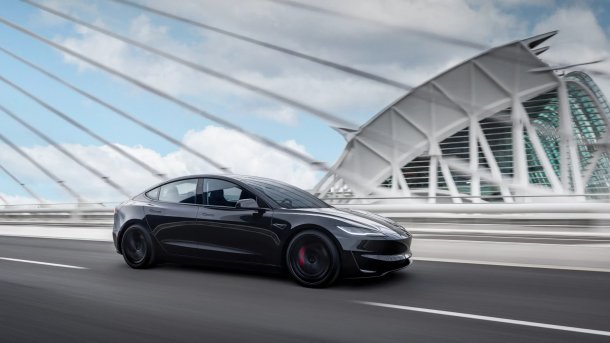Tesla brings forward new e-car models, share price jumps despite slowing growth
Tesla records falling sales and profits. Nevertheless, the share price jumps because new and cheaper electric cars are set to arrive sooner than expected.

Tesla Model 3
(Bild: Tesla)
The US company Tesla recorded a significant drop in revenue at the beginning of this year because demand for electric cars has fallen. Prices were also reduced, which cut into profits. However, the share price is still making a considerable leap, as Tesla promises that new electric cars will go into production as early as the beginning of 2025, including more affordable models. This was previously only planned for the second half of next year.
The new models will use aspects of the next-generation electric car platform as well as previous platforms, Tesla explains. They will therefore be able to use the same production lines as the current electric cars. This will probably make production slightly more expensive than with a completely new production line, but Tesla expects this to result in a faster and more efficient ramp-up of production of the new models.
New electric cars from existing factories
Tesla CEO Elon Musk did not want to give any details about the new models in talks with investors, writes Reuters. It had previously been reported that the electric car manufacturer had canceled plans for a supposedly cheaper "Model 2". The upcoming cheaper electric car will apparently not be completely new, but will not require a new factory or factory equipment. It is unclear whether this will be the entry-level model for 25,000 euros that Tesla wants to produce in Grünheide.
Tesla is also continuing to work on its Robotaxi plans, which are based on its own FSD (Full Self Driving) driving assistant that enables autonomous driving. Accordingly, Tesla wants to maintain its own fleet of Robotaxis, but at the same time allow customers to make their own electric car available for this purpose. Musk describes the planned robotaxi fleet as a "combination of Airbnb and Uber".
Turnover down for the first time since 2020
These plans have apparently placated investors, as the first-quarter result fell short of expectations. Even after Tesla had previously announced that it had sold fewer electric cars for the first time, the stock market had expected sales of over 22 billion US dollars, the first decline since 2020, when the coronavirus pandemic affected production and deliveries. However, total sales in the first three months of this year were only 21.3 billion dollars.
Read also
Elektromobilität: Teslas richtungsweisende Pläne
Tesla: Preissenkungen in vielen Märkten, Fahrassistent FSD wird noch günstiger
Tesla in Grünheide: "Wir lassen uns nicht vertreiben"
Autonomous driving promised: Lawsuit against Tesla admitted
Missing link: A Chinese ship is coming – even for autonomous driving?
This is 9 percent less than a year ago, with sales of electric cars falling by as much as 13 percent. On the other hand, other business areas such as electricity generation and storage and services grew by 7 and 25 percent respectively. However, these company segments are significantly smaller than the automotive sector, which accounts for almost 82 percent of total turnover.
Profits fall more sharply, share price rises
Tesla's profits have fallen even more sharply than turnover. Year-on-year, operating profit fell by 56 percent to 1.17 billion dollars and net profit by 55 percent to 1.13 billion dollars. Tesla blames this on reduced sales prices, fewer electric cars sold, the negative impact of exchange rates and the costs of ramping up Cybertruck production, among other things. Tesla also attributes the decline in deliveries to production changes for the Model 3 in the US factories and the arson attack in Grünheide, which led to a power outage and interruptions to production.
However, this did not deter investors. In after-hours trading, Tesla's shares rose by just over 13 percent, having already gained almost two percent during the day. However, the stock has lost around 42 percent of its value since the beginning of the year.
(fds)